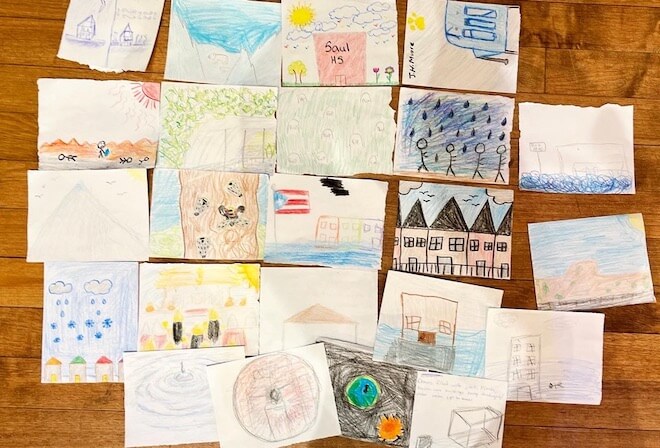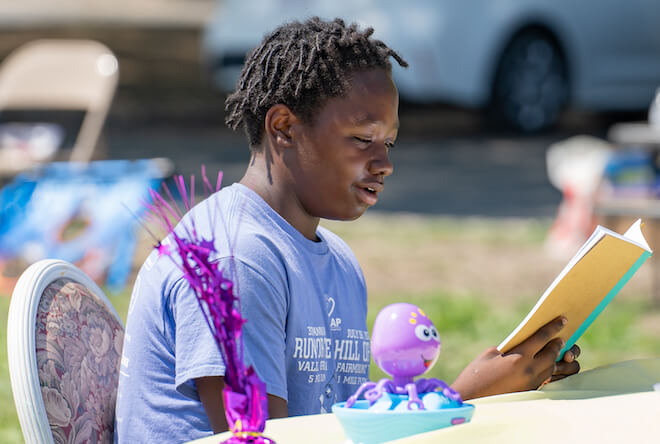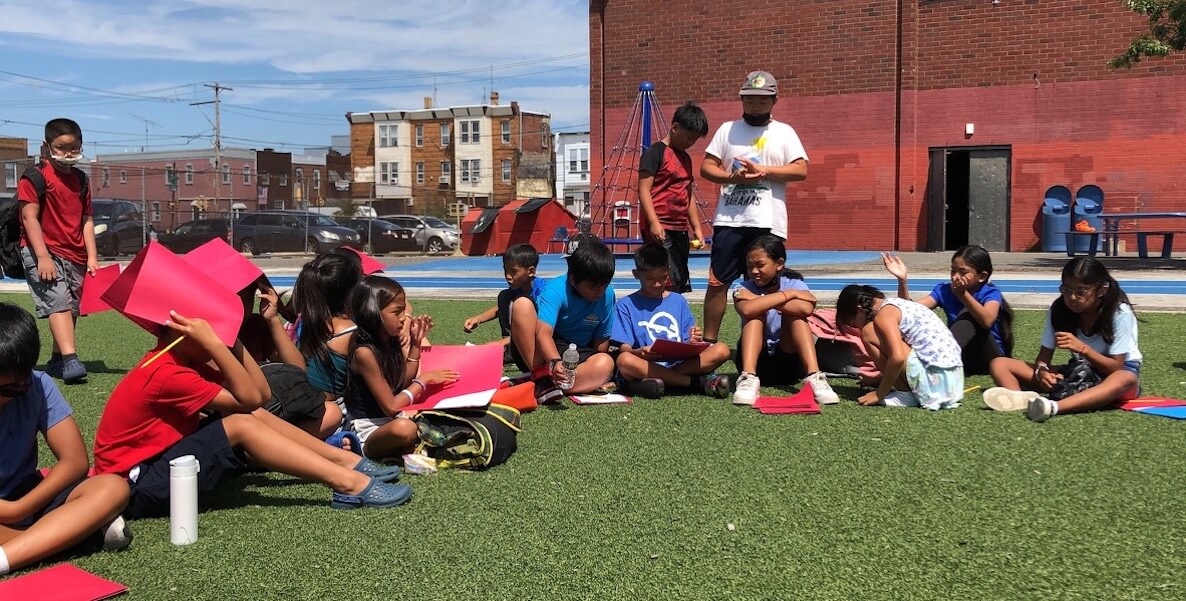On a sunny day last summer, Soky Chhe, OST camp coordinator for the Cambodian Association of Greater Philadelphia, spread a blanket out on the Taggart School lawn and sat down with her students. One by one, kindergartners, first and second graders read aloud short stories they had written. This was the culmination of the camp’s partnership Cosmic Writers, a creative writing nonprofit for kids.
Sitting there, Chhe worried about one child who’d recently immigrated from Cambodia. He hadn’t yet gone to school here; English was new to him. Every Thursday, he’d sit attentively as a college-age instructor would read aloud from a picture book and talk about basic elements of a story: character, plot, etc. Chhe, who grew up speaking Khmer, would translate.
This day, the student stood up, opened his paper, and revealed illustrations and a story he’d written … in English, with help from Chhe. Then, he read it aloud. Just like the other kids.
“Having someone from Cosmic Writers come in and … engage kids in reading, writing and literacy has just been such a great thing for them,” Chhe says, calling the read-aloud, a “celebration of the things that we were doing together.”
Herein lies Cosmic Writers’ mission: Build community and improve literacy through quality creative writing education. Since 2020, the organization has been transforming how kids across Philly read and write by imparting the power of storytelling. Today, Cosmic Writers has taught over 500 students, has several full and part-time employees, and is expanding across the city and country.
They’re seeing results, too. After completing a Cosmic Writers’ course, the average student scores .6 grade levels higher on the Flesch-Kincaid scale, which measures writing complexity. At the end of a Cosmic Writers workshop, students’ writing samples are 32 percent longer and more robust.

How it started
In 2020, Rowana Miller was a sophomore at the University of Pennsylvania studying sociology, with minors in urban education and creative writing. When Covid arrived, Penn students had to move off-campus. The university pivoted to virtual classes in March, 2020. Miller grew concerned about the pandemic’s impact on school-age students in Philadelphia. She remembers thinking about and discussing the issue in her urban ed classes. “It was becoming very clear that just nobody knew how to keep kids engaged,” she says.
The shift to virtual learning left teachers struggling to keep students focused. As if online learning weren’t bad enough, pandemic-induced stress contributed to higher rates of anxiety and depression among students, the National Institutes of Health reports. By the end of the 2020-2021 school year, on average, K-12 students were four months behind in reading education, per a McKinsey analysis.
It was worse for Philly kids. Our city has long lagged behind when it comes to teaching students to read and write. Only 17 percent of the city’s fourth graders earned proficiency in reading on the Pennsylvania System of School Assessment exam in 2019. In 2022, that number dropped to just 15 percent, per reporting from WHYY.
As the pandemic spring turned toward a pandemic summer, Miller watched summer camps, too, go virtual. It didn’t make sense, she thought, for students to take part in soccer and wildlife camps on a screen. Yet, that was what was happening. “A lot of the time, the camps that were going online were the ones that it felt strange to be doing from the computer,” Miller says, “and so I thought, Okay, what’s something that really makes sense to do from your computer?”
Word Camp
A long-time writer — she authored two unpublished novels by the time she graduated high school — Miller thought creative writing would be the perfect activity for students looking for virtual summer enrichment. In college, writing had helped her find community. She hoped it would do the same for younger students, and, along the way, boost their reading and writing.
Miller realized she just needed instructors. At Penn, Miller was surrounded by bright classmates who studied education, cared deeply about writing — and had just lost in-person summer internships. They would make great teachers, she thought.
So, she applied for and received a $3,000 grant through the University of Pennsylvania, hired six instructors, and launched Word Camp, a free, virtual creative writing workshop for K-12 students. Miller leaned on her education studies, Penn’s Kelly Writers House, and her peers’ experience to create a curriculum. She advertised Word Camp online. The day registration opened, 150 families signed up. “It was an incredible response, way beyond what we could have predicted,” Miller says.
The next summer, Word Camp returned as a virtual program, again, with support from the Kelly Writers House. By early 2022, Miller had realized students needed and wanted creative writing beyond the summer months. She launched a nonprofit, and called it Cosmic Writers
A few months later, Miller graduated with Penn’s President Engagement Prize — a $200,000 for Cosmic Writers. Soon thereafter, the organization joined forces with the Free Library of Philadelphia system and Kirkbride, a K-8 school in Passyunk Square, for their first in-person workshops.
That summer, Cosmic Writers expanded programming to 13 virtual workshops and an in-person nature writing camp and festival in FDR Park. There was no need for Miller to look for work out of college. She’d found it.
From writing monsters and villains to hip hop and poetry
Cosmic Writers courses take place in schools and community centers, in partnerships and independently, indoors and outdoors, virtually and in-person, three days or five weeks. They’ve taken field trips to the Kelly Writers House and collabed with communities on themes that appeal to specific students: Black Panther? Suspense writing? Afro-futurism? College (ugh) essays? Nature writing?
“The commonality we’ve found with the workshops that are successful is the workshops that connect to things that the kids already enjoy,” says Ian McCormack, director of programs for Cosmic Writers. McCormack met Miller as students at Penn, where he studied history and creative writing. He was part of Cosmic Writers’ first teaching cohort. After graduation, he joined full-time.
He continues, “This is true of our high school-aged students who already know they really like creative writing, and our younger students who might not even really know what creative writing is.”
In many ways, the mission of Cosmic Writers is similar to that of Mighty Writers and Spells Writing Lab, two older writing-centric nonprofits that work to empower Philly students through writing. Two main differences: Cosmic Writers is designed without a central locations and always staffed by college-age instructors with dual passions for writing and teaching.

Cosmic instructors
Cosmic Writers’ model is flexible in order to reach as many students as possible. Miller and McCormack like to say they’re creating the programs they wished they had when they were young, writing fantasy or thrillers alone in their bedrooms. Writing can be lonely. It can also be … ego-bruising.
“We never did creative writing in school,” McCormack says. “I remember showing one of my pieces of writing … to one of my English teachers in fifth grade, and I could tell he didn’t like it. He wasn’t bad about it in any way, but I could tell that he didn’t really think it was very good … I didn’t write for the next two years.”
Part of the four-week instructor training — all are college-age, from Penn and other schools — includes professional development, curriculum development (a critical skill for future teachers), lessons on educational equity. They emphasize helping young students feel good about their accomplishments and encouraging positive feedback among student groups.
Just about every workshop is free or pay-what-you-can. When an organization sponsoring a Cosmic Writers program can’t afford to pay a fee, Cosmic Writers works to help find outside funding. Instructors earn upwards of $100 per class.
Where Cosmic Writers is going
Dylan Fritz is a Cosmic Writers instructor and Penn junior studying creative writing and English. He met Miller as a freshman; they both worked at the Kelly Writers House. Last year, Fritz taught virtual workshops. This year, he also taught in-person in Philly — fantasy writing for elementary schoolers and monster writing for middle schoolers. He likes being with the kids, but really appreciates the online workshops.
“The virtual programs … allow us to reach kids from Maine to California,” Fritz says. “It … [is] something that I would have really liked to have had as a kid, something that provides these opportunities to have fun with creative writing as a student.”
Word Camp is still virtual only. It begins today. Among the one-hour-for-three-days sessions: spy stories, magical realism, creative nonfiction, and “hermit crab poetry” They’re free, of course, but the registration page lists a suggested donation of $50. Signups are now open. (These workshops take place July 10 to 14 and July 17 to 20, with more summer programming TBA.)
Last year, Cosmic Writers launched its first in-person program in New York City in partnership with Harlem Grown. Miller would like to do more. Her ultimate goal: “For any school library or community organization in the country to be able to call us up and ask for a creative writing workshop. And for us to be able to send an instructor from the local university.”
Correction: A previous version of this post misstated the growth of grade levels among students who’d completed a Cosmic Writers course.
![]() MORE ON LITERACY FROM THE CITIZEN
MORE ON LITERACY FROM THE CITIZEN
Cosmic Writers at the Taggart School.



